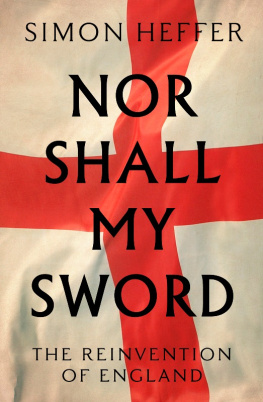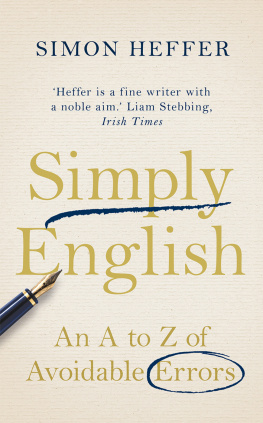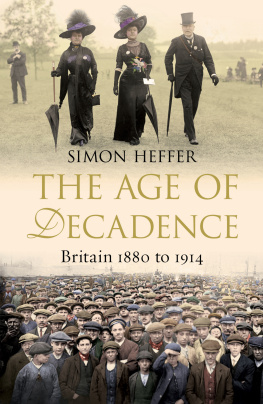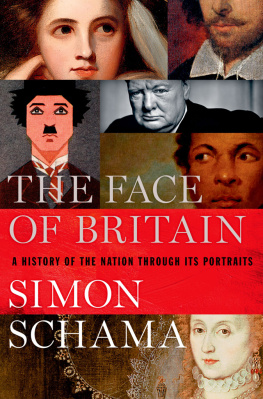Simon Heffer - Staring at God: Britain in the Great War
Here you can read online Simon Heffer - Staring at God: Britain in the Great War full text of the book (entire story) in english for free. Download pdf and epub, get meaning, cover and reviews about this ebook. year: 2019, publisher: Random House Books, genre: Politics. Description of the work, (preface) as well as reviews are available. Best literature library LitArk.com created for fans of good reading and offers a wide selection of genres:
Romance novel
Science fiction
Adventure
Detective
Science
History
Home and family
Prose
Art
Politics
Computer
Non-fiction
Religion
Business
Children
Humor
Choose a favorite category and find really read worthwhile books. Enjoy immersion in the world of imagination, feel the emotions of the characters or learn something new for yourself, make an fascinating discovery.

- Book:Staring at God: Britain in the Great War
- Author:
- Publisher:Random House Books
- Genre:
- Year:2019
- Rating:4 / 5
- Favourites:Add to favourites
- Your mark:
- 80
- 1
- 2
- 3
- 4
- 5
Staring at God: Britain in the Great War: summary, description and annotation
We offer to read an annotation, description, summary or preface (depends on what the author of the book "Staring at God: Britain in the Great War" wrote himself). If you haven't found the necessary information about the book — write in the comments, we will try to find it.
Staring at God: Britain in the Great War — read online for free the complete book (whole text) full work
Below is the text of the book, divided by pages. System saving the place of the last page read, allows you to conveniently read the book "Staring at God: Britain in the Great War" online for free, without having to search again every time where you left off. Put a bookmark, and you can go to the page where you finished reading at any time.
Font size:
Interval:
Bookmark:

Simon Heffer was born in 1960. He read English at Cambridge and took a PhD in modern history at that university. His previous books include: Moral Desperado: A Life of Thomas Carlyle, Like the Roman: The Life of Enoch Powell, Power and Place: The Political Consequences of King Edward VII, Nor Shall My Sword: The Reinvention of England, Vaughan Williams, Strictly English, A Short History of Power, Simply English and High Minds: The Victorians and the Birth of Modern Britain. In a thirty-year career in Fleet Street, he has held senior editorial positions on The Daily Telegraph and The Spectator, and is now a columnist for The Daily Telegraph and The Sunday Telegraph.
This war has caught us at our worst and now that shrapnel is killing an entire generation, we are left staring at God.
Margot Asquith, Diary, 26 October 1914
Kitchener, in creating an army, has created love. This is a great change in a country where only marriage was known before.
Report in a Spanish newspaper, sent to Bertrand Russell by George Santayana, 5 May 1915
Someone will turn up. The war will disclose a genius.
Lord Northcliffe to Sir George Riddell, 5 June 1915
But this I would say, standing, as I do, in view of God and eternity. I realise that patriotism is not enough. I must have no bitterness or hatred towards anyone.
Edith Cavell to the Revd Stirling Gahan, Brussels, 11 October 1915
The direct descendant of Judas Iscariot.
Clementine Churchill, on Lloyd George, letter to her husband, 30 December 1915
There seems to be something wrong with our bloody ships today, Chatfield.
Vice Admiral Sir David Beatty to Captain Ernle Chatfield, Jutland, 31 May 1916
Believe me England is not rotten. It is a nation of lions led by asses and knaves. England is all right at heart. I have never lost faith in the people. But I have lost faith in all our leaders.
H. A. Gwynne, letter to Countess Bathurst, 15 January 1918
My Lords, is it not a terribly sad thing to think that we have practically made no progress during the last fifty years in acquiring the love and affection of the Irish people?
Reginald Brabazon, 12th Earl of Meath, addressing the House of Lords, 12 March 1918
Every position must be held to the last man; there must be no retirement. With our backs to the wall, and believing in the justice of our cause, each one of us must fight on to the end.
Field Marshal Sir Douglas Haig, dispatch, 11 April 1918
One will have to look at long vistas again, instead of short ones, and one will at last fully recognise that the dead are not only dead for the duration of the war.
Lady Cynthia Asquith, Diary, 7 October 1918
To Greville Howard
Lamiti, comme le vin, se bonifie avec le temps

Extracts from the diary of His late Majesty King George V and from the papers of Lord Stamfordham are reproduced by gracious permission of Her Majesty the Queen.
A number of people generously provided assistance with access to archives, or supplied me with research materials, introductions and other information that was invaluable in writing this book. I should like to thank William Alden; Professor Chris Andrew; Professor Ian Beckett; Frank Bowles; the Rt Hon Sir Simon Burns; Dr Matthew Butler; Julie Crocker; His Honour Judge Edmunds QC; Professor Gerard DeGroot; Will Heaven; Laura Hobbs; the Revd Mark Jones; Professor Colin Lawson; Sam Lindley; Brigadier Allan Mallinson; Leo McKinstry; Iona McLaren; Annie Pinder; Lord Rayleigh; Andrew Riley; Hon William Strutt; Oliver Urquhart-Irvine; Mr and Mrs Tom Ward; and Melissa Whitworth. I am also grateful to members of staff in the Royal Archives at Windsor Castle; the Bodleian Library, Oxford; the British Library, London; the Cambridge University Library; Churchill College, Cambridge; the National Archives, Kew; and the Parliamentary Archives in the Palace of Westminster.
I was saved from various errors by Mary Chamberlain, who copy-edited the book with a high degree of meticulousness and intelligence. The superlative design of the dust-wrapper is by Stephanie Heathcote. Sue Brealey once more undertook the proofreading with unusual skill and dedication, and I am immensely in her debt. The book was also proofread by Alison Rae, and it was indexed by Vicki Robinson.
My agent, Georgina Capel, supported me with her customary loyalty and commitment, as she has throughout the three volumes of this project, which was originally her idea. And I have been especially fortunate in having a publisher of the skill, patience and insight of Nigel Wilcockson, who once more has brought the highest standards of refinement and production to my manuscript, leaving it far more coherent than he found it. All errors that remain are mine alone.
My final and most important expression of gratitude is to my beloved wife, Diana, who has now lived for almost a decade with this attempt to retell and amplify recent British history, as have our sons, Fred and Johnnie Heffer. Some readers will assume I exaggerate in claiming that I could not have written this book, or either of its predecessors, without her unfailing and ungrudging support; other writers will know all too well that I do not.
Simon Heffer
Great Leighs
15 May 2019

This is not a military history. It is the story of how the government and people of a great naval and mercantile power, shaped by the tenets of laissez-faire, broke with the traditions of their culture, liberties, doctrines and customs, and adapted to total war. It tells how, with speed and uncertainty, the British state suddenly mobilised in August 1914; how it created a vast army, restricted freedom of action and expression, and prevailed over a formidable enemy; and how the country emerged radically and irrevocably changed. It describes international events from the British perspective: how the government came to take Britain into a catastrophic war because a Yugoslavist nationalist murdered an Austrian archduke in distant Bosnia; the impact of the conflict on the nation and its people; and their difficult readjustment to peace after total war, in a new dispensation where women could vote, the Russian revolution had inspired the working class, and a coalition government of new men had made promises it had little prospect of keeping.
This is the third of what is planned to be a four-volume account of Great Britain between 1838 and 1939, a transformative century surpassing even those after the Roman invasion, the Norman Conquest and the Reformation. The five years between the assassination of Archduke Franz Ferdinand in Sarajevo, on 28 June 1914, and the conclusion of the Versailles Treaty, on 28 June 1919, saw a metaphorical revolution in Britain to compare with the literal ones in parts of Europe and in Russia: though one was effectively accomplished in Ireland by the ballot box in December 1918.
Font size:
Interval:
Bookmark:
Similar books «Staring at God: Britain in the Great War»
Look at similar books to Staring at God: Britain in the Great War. We have selected literature similar in name and meaning in the hope of providing readers with more options to find new, interesting, not yet read works.
Discussion, reviews of the book Staring at God: Britain in the Great War and just readers' own opinions. Leave your comments, write what you think about the work, its meaning or the main characters. Specify what exactly you liked and what you didn't like, and why you think so.








